[FONT=宋体]加拿大研究人员最近做的检测则揭开了造成这种巨大危害的物质原因。 把这两项由处于地球两面的科研人员所做的研究结合起来看, 就彻底戳穿了转基因分子们多年来招摇撞骗、欺世盗名的弥天大谎:转基因毒素只对特定的害虫有毒,对人体无毒无害;而且,加拿大研究人员在人体内除了检测到Bt/Cry1Ab杀虫蛋白毒素外, 还检测到了转基因作物使用的农药 - 草甘磷(GLYP)及其代谢物[/FONT][FONT=宋体]氨甲基磷酸(AMPA)[/FONT][FONT=宋体]以及草铵磷(GLUF)及其代谢物[/FONT][FONT=宋体]3-[/FONT][FONT=宋体]甲基磷酸亚基丙酸(3-MPPA)[/FONT][FONT=宋体],这足以证明转基因对人体、胎儿以及后代构成多种危害。 [/FONT]
[FONT=宋体] [/FONT]
[FONT=宋体]加拿大研究人员的研究报告共有5大部分:[/FONT][FONT=宋体] [/FONT]
[FONT=宋体]一.译文 [/FONT]
[FONT=宋体] [/FONT]
[FONT=宋体]加拿大魁北克省几个东部乡镇孕妇与胎儿体内检测出与转基因食品有关联的多种农药成分 [/FONT]
[FONT=宋体]Maternal and fetal exposure to pesticides associated to genetically modified foods in Eastern Townships of Quebec, Canada [/FONT]
[FONT=宋体] [/FONT]
[FONT=宋体]作者:Aziz Aris (加拿大魁北克省舍布鲁克市中心医院大学妇产科系Department of Obstetrics and Gynecology, University of Sherbrooke Hospital Centre, Sherbrooke, Quebec, Canada,舍布鲁克市中心医院大学临床研究中心Clinical Research Centre of Sherbrooke University Hospital Centre, Sherbrooke, Quebec, Canada, 舍布鲁克市大学医学与健康学院Faculty of Medicine and Health Sciences, University of Sherbrooke, Sherbrooke, Quebec, Canada) [/FONT]
[FONT=宋体]Samuel Leblanc ([/FONT][FONT=宋体]舍布鲁克市大学医学与健康学院) [/FONT]
[FONT=宋体] [/FONT]
[FONT=宋体]总目录 [/FONT]
[FONT=宋体]1. [/FONT][FONT=宋体]介绍Introduction [/FONT]
[FONT=宋体]2. [/FONT][FONT=宋体]材料与方法 Materials and methods [/FONT]
[FONT=宋体]2.1. [/FONT][FONT=宋体]化学品与试剂 Chemicals and reagents [/FONT]
[FONT=宋体]2.2. [/FONT][FONT=宋体]研究对象与血液样本 Study subjects and blood sampling [/FONT]
[FONT=宋体]2.3. [/FONT][FONT=宋体]除草剂与代谢物的测定[/FONT][FONT=宋体]Herbicide and metabolite determination[/FONT][FONT=宋体] [/FONT]
[FONT=宋体]2.3.1. [/FONT][FONT=宋体]校验曲线Calibration curve [/FONT]
[FONT=宋体]2.3.2. [/FONT][FONT=宋体]提取程序 Extraction procedure [/FONT]
[FONT=宋体]2.3.3. [/FONT][FONT=宋体]气体色谱法与质谱分析[/FONT][FONT=宋体]GCMS analysis [/FONT]
[FONT=宋体]2.4. Cry1Ab[/FONT][FONT=宋体]杀虫蛋白测定 Cry1Ab protein determination [/FONT]
[FONT=宋体]2.5. [/FONT][FONT=宋体]统计分析 Statistical analysis [/FONT]
[FONT=宋体]3. [/FONT][FONT=宋体]结果 Results [/FONT]
[FONT=宋体]4. [/FONT][FONT=宋体]讨论 Discussion [/FONT]
[FONT=宋体]5. [/FONT][FONT=宋体]结论 Conclusions [/FONT]
[FONT=宋体]权益冲突声明 Conflict of interest statement [/FONT]
[FONT=宋体]致谢 Acknowledgements [/FONT]
[FONT=宋体]参考文献 References [/FONT]
[FONT=宋体] [/FONT]
[FONT=宋体]摘要 [/FONT]
[FONT=宋体]研究出与转基因食品相关联的农药(PAGMF)是为了让转基因作物能够耐受这些农药,例如,[/FONT][FONT=宋体]草甘磷(GLYP)和[/FONT][FONT=宋体]草铵磷[/FONT][FONT=宋体](GLUF)[/FONT][FONT=宋体]之类的除草剂或者[/FONT][FONT=宋体]苏云金杆菌[/FONT][FONT=宋体](Bt)[/FONT][FONT=宋体]细菌毒素之类的杀虫剂。 本次研究旨在评估加拿大魁北克省东部几个乡镇孕妇与胎儿体内所含农药毒素的关联性,并测定所含[/FONT][FONT=宋体]草甘磷(GLYP)及其[/FONT][FONT=宋体]代谢物氨甲基磷酸(AMPA)、[/FONT][FONT=宋体]草铵磷[/FONT][FONT=宋体](GLUF)[/FONT][FONT=宋体]及其代谢物[/FONT][FONT=宋体]3-[/FONT][FONT=宋体]甲基磷酸亚基丙酸(3-MPPA)以及[/FONT][FONT=宋体]Cry1Ab[/FONT][FONT=宋体]转基因杀虫蛋白(一种Bt毒素)[/FONT][FONT=宋体]等[/FONT][FONT=宋体]毒素的不同含量。我们研究了30位孕妇(PW)和39位非孕妇(NPW)的血液样本。非孕妇血清中检测到了[/FONT][FONT=宋体]草甘磷(GLYP)和[/FONT][FONT=宋体]草铵磷[/FONT][FONT=宋体](GLUF)[/FONT][FONT=宋体],孕妇血清中则未检出。 在孕妇、胎儿和非孕妇血清中检测到了[/FONT][FONT=宋体]3-[/FONT][FONT=宋体]甲基磷酸亚基丙酸(3-MPPA)以及[/FONT][FONT=宋体]Cry1Ab[/FONT][FONT=宋体]杀虫蛋白毒素。这个研究首次揭示了孕妇和非孕妇体内存在循环的与转基因食品相关联的农药(PAGMF),为[/FONT][FONT=宋体]生殖毒理学包括营养与子宫胎盘毒性研究开辟了新的领域。[/FONT][FONT=宋体] [/FONT]
[FONT=宋体] [/FONT]
[FONT=宋体]abstract [/FONT]
[FONT=宋体]Pesticides associated to genetically modified foods (PAGMF) are engineered to tolerate herbicides such as glyphosate (GLYP) and gluphosinate (GLUF) or insecticides such as the bacterial toxin bacillus thuringien-sis (Bt). The aim of this study was to evaluate the correlation between maternal and fetal exposure, and to determine exposure levels of GLYP and its metabolite aminomethyl phosphoric acid (AMPA), GLUF and its metabolite 3-methylphosphinicopropionic acid (3-MPPA) and Cry1Ab protein (a Bt toxin) in Eastern Townships of Quebec, Canada. Blood of thirty pregnant women (PW) and thirty-nine nonpregnant women (NPW) were studied. Serum GLYP and GLUF were detected in NPW and not detected in PW. Serum 3-MPPA and CryAb1 toxin were detected in PW, their fetuses and NPW. This is the first study to reveal the presence of circulating PAGMF in women with and without pregnancy, paving the way for a new field in reproductive toxicology including nutrition and utero-placental toxicities. [/FONT]
[FONT=宋体] [/FONT]
[FONT=宋体]4. [/FONT][FONT=宋体]讨论[/FONT][FONT=宋体] [/FONT]
[FONT=宋体]我们的研究结果表明,孕妇和胎儿血液里没有检测到[/FONT][FONT=宋体]草甘磷(GLYP),但在一些非孕妇(5%)的血液里有检测到, 然而其[/FONT][FONT=宋体]代谢物氨甲基磷酸(AMPA)在所有血液样本里均未检测到。这可能是因为没有接触、有效排除或者检测方式的局限。 以前的研究报告指出[/FONT][FONT=宋体]草甘磷(GLYP)和[/FONT][FONT=宋体]氨甲基磷酸(AMPA)有着类似的毒理学特征。草甘磷的毒性被证明会引起胎儿骨骼发育迟缓,还会对青春期和成年期的维斯塔(Wistar)雄鼠的生殖系统造成严重不良影响。 而且,[/FONT][FONT=宋体]草甘磷损害人类胎盘细胞和胚胎干细胞。一个需要注意的有趣现象是,与我们研究中在人体内发现的剂量相比, 在所有的活体动物和试管研究中使用的草甘磷浓度都很高。在这方面,我们的研究结果代表了人体内检测到的实际草甘磷浓度,因此,它们成为该领域未来研究的参考依据。[/FONT][FONT=宋体] [/FONT]
[FONT=宋体] [/FONT]
[FONT=宋体]4. Discussion [/FONT]
[FONT=宋体]Our results show that GLYP was not detected in maternal and fetal blood, but present in the blood of some non-pregnant women (5%), whereas its metabolite AMPA was not detected in all analyzed samples. This may be explained by the absence of exposure, the efficiency of elimination or the limitation of the method of detection. Previous studies report that glyphosate and AMPA share similar toxicological profiles. Glyphosate toxicity has been shown to be involved in the induction of developmental retardation of fetal skeleton and significant adverse effects on the reproductive system of male Wistar rats at puberty and during adulthood. Also, glyphosate was harmful to human placental cells and embryonic cells. It is interesting to note that all of these animal and in vitro studies used very high concentrations of GLYP compared to the human levels found in our studies. In this regard, our results represent actual concentrations detected in humans and therefore they constitute a referential basis for future investigations in this field. [/FONT]
[FONT=宋体] [/FONT]
[FONT=宋体]在18%非孕妇血液里检测到了草铵磷,而孕妇和胎儿血液里未检出。相对于草甘磷,没有检测到草铵磷可能是因为没有接触、有效排除或者检测方式的局限。关于与非孕妇相比孕妇体内没有检测到某些化学物质, 大概是怀孕引起的血液稀释造成的, 这至少是一部分原因。另一方面,在100%孕妇和脐带血液样本里以及67%非孕妇血液样本里检测到了[/FONT][FONT=宋体]3-[/FONT][FONT=宋体]甲基磷酸亚基丙酸[/FONT][FONT=宋体](3-MPPA[/FONT][FONT=宋体],[/FONT][FONT=宋体]草铵磷[/FONT][FONT=宋体]的代谢物)。[/FONT][FONT=宋体]这充分说明,这种代谢物比它的前体(即:草铵磷,GLUF)更容易检测到,而且似乎能轻易穿过胎盘进入胎儿体内。加西亚等人研究过人体内草安磷可能的的致畸作用,他们发现,接触草安磷越多,先天性畸形的风险就越大。研究表明,草安磷也造成小鼠胚胎发育迟缓、增加死亡或者发育不全。相对于草甘磷,[/FONT][FONT=宋体]一个需要注意的有趣现象是,与我们研究中在人体内发现的剂量(53.6ng/ml)相比,在这些动物实验中草安磷的浓度非常高(10ug.ml)。因此,我们的数据提供了这些有毒物质的实际和准确浓度, 这将有助于未来进行更多的相关研究。 [/FONT]
[FONT=宋体] [/FONT]
[FONT=宋体]GLUF was detected in 18% of non pregnant women’s blood and not detected in maternal and fetal blood. As for GLYP, the non detection of GLUF may be explained by the absence of exposure, the efficiency of elimination or the limitation of the method of detection. Regarding the non-detection of certain chemicals in pregnant women compared with non pregnant women, it is assumed that the hemo dilution caused by pregnancy may explain, at least in part, such non-detection. On the other hand, 3-MPPA (the metabolite of GLUF) was detected in 100% of maternal and umbilical cord blood samples, and in 67% of the non pregnant women’s blood samples. This highlights that this metabolite is more detectable than its precursor and seems to easily cross the placenta to reach the fetus. Garcia et al. investigated the potential teratogenic effects of GLUF in humans and found an increased risk of congenital malformations with exposure to GLUF. GLUF has also been shown in mouse embryos to cause growth retardation, increased death or hypoplasia. As for GLYP, it is interesting to note that the GLUF concentrations used in these tests are very high (10ug/ml) compared to the levels we found in this study (53.6ng/ml). Hence, our data which provide the actual and precise concentrations of these toxicants, will help in the design of more relevant studies in the future. [/FONT]
[FONT=宋体] [/FONT]
[FONT=宋体]另一方面, 分别在93%孕妇、80%胎儿和69%非孕妇的血液样本中检测到了Cry1Ab (转基因)杀虫蛋白毒素。尚无其他研究可以与我们的研究结果进行比较。但是,在食用转基因玉米家畜的胃肠道成分里检测到了微量的Cry1Ab抗虫蛋白毒素,进而引起了人们对各种抗虫转基因作物所含的这种毒素的担忧:(1) 这些毒素也许不能有效地排除人体 (2) 食用被(转基因)污染的肉类可能存在(摄入转基因毒素的)高风险。 [/FONT]
[FONT=宋体] [/FONT]
[FONT=宋体]On the other hand, Cry1Ab toxin was detected in 93% and 80% of maternal and fetal blood samples, respectively and in 69% of tested blood samples from non pregnant women. There are no other studies for comparison with our results. However, trace amounts of the Cry1Ab toxin were detected in the gastrointestinal contents of livestock fed on GM corn, raising concerns about this toxin in insect-resistant GM crops: (1) that these toxins may not be effectively eliminated in humans and (2) there maybe a high risk of exposure through consumption of contaminated meat. [/FONT]
[FONT=宋体] [/FONT]
[FONT=宋体]5. [/FONT][FONT=宋体]结论[/FONT][FONT=宋体] [/FONT]
[FONT=宋体]据我们所知,这是首次确证在孕妇、胎儿和非孕妇血液里存在与转基因食品相关联的农药成分的研究。3-甲基磷酸亚基丙酸(3-MPPA)和Cry1Ab杀虫蛋白毒素被明确检测出来,似乎通过胎盘进入胎儿体内。鉴于这些环境污染物可能的毒性以及胎儿的脆弱性,还需要作进一步的研究, 特别是使用胎盘转移法的人士。因此,我们目前的研究结果将为探索有关女性营养学、毒理学和生殖学等未来的新研究领域提供基准数据。现在,与环境化学物质有关的产科-妇科疾病疾病尚不清楚。这可能涉及到围产期并发症(例如流产、早产、子宫内生长受限和先兆子痫)以及生殖疾患(例如不孕症、子宫内膜异位症和妇科癌症)。因此,确定人体内与转基因食品有关联的农药(PAGMF)的浓度就奠定了这个研究领域取得进展的基石。 [/FONT]
[FONT=宋体] [/FONT]
[FONT=宋体]5. Conclusions [/FONT]
[FONT=宋体]To our knowledge, this is the first study to highlight the presence of pesticides-associated genetically modified foods in maternal, fetal and non pregnant women’s blood. 3-MPPA and Cry1Ab toxin are clearly detectable and appear to cross the placenta to the fetus. Given the potential toxicity of these environmental pollutants and the fragility of the fetus, more studies are needed, particularly those using the placental transfer approach. Thus, our present results will provide baseline data for future studies exploring a new area of research relating to nutrition, toxicology and reproduction in women. Today, obstetric-gynecological disorders that are associated with environmental chemicals are not known. This may involve perinatal complications (i.e. abortion, prematurity, intra uterine growth restriction and preeclampsia) and reproductive disorders (i.e. infertility, endometriosis and gynecological cancer). Thus, knowing the actual PAGMF concentrations in humans constitutes a cornerstone in the advancement of research in this area. [/FONT]
[FONT=宋体] [/FONT]
[FONT=宋体]二.注解[/FONT][FONT=宋体] ([/FONT][FONT=宋体]选自网络) [/FONT]
[FONT=宋体] [/FONT]
[FONT=宋体]1. Bt [/FONT][FONT=宋体]转基因[/FONT][FONT=宋体]。是转基因的主要方式,目前的作物主要有Bt转基因玉米、Bt转基因水稻等。Bt是昆虫病原细菌苏云金杆菌(Bacillus thuringiensis)的英文单词缩写,是包括许多变种的一类产晶体芽孢杆菌。可用于防治直翅目、鞘翅目、双翅目、膜翅目,特别是鳞翅目的多种害虫。所谓的Bt转基因, 就是用 “基因枪”把苏云金杆菌/Bt的基因导入到受体的细胞内,完成遗传转化,关于转基因技术操作与基因枪的简介,请网搜帖子《转基因插入手术的粗陋:戳穿转基因枪的画皮》或者搜索关键词。[/FONT][FONT=宋体] [/FONT]
[FONT=宋体] [/FONT]
[FONT=宋体]2. Cry1Ab[/FONT][FONT=宋体]杀虫蛋白[/FONT][FONT=宋体]。 20世纪50年代中期,科学家发现Bt蛋白对部分昆虫的毒性来自孢子形成过程中产生的晶体蛋白质。1981年,科学家提纯了这种蛋白质并命名为cry。随后他们克隆了cry的基因。几年以后,美国的科学家把cry的基因转入玉米和棉花中。我们现在说的Bt转基因,事实上就是cry转基因。 [/FONT]
[FONT=宋体] [/FONT]
[FONT=宋体]3. [/FONT][FONT=宋体]草甘磷[/FONT][FONT=宋体](glyphosate[/FONT][FONT=宋体],缩写为GLYP)。[/FONT][FONT=宋体]是由美国孟山都公司开发的使用最广的除草剂,又称:镇草宁、农达(Roundup)等。为内吸传导型慢性广谱灭生性除草剂,主要抑制物体内烯醇丙酮基莽草素磷酸合成酶,从而抑制莽草素向苯丙氨酸、酷氨酸及色氨酸的转化,使蛋白质的合成受到干扰导致植物死亡。草甘磷是通过茎叶吸收后传导到植物各部位的,可防除单子叶和双子叶、一年生和多年生、草本和灌木等40多科的植物。对中炭钢、镀锌铁皮(马口铁)有腐蚀作用。根据Global Research的消息,有新的科学研究已经证实了孟山都公司的[/FONT][FONT=宋体]草甘磷[/FONT][FONT=宋体]产品存在毒性,威胁人体和动物的机体。 [/FONT]
[FONT=宋体] [/FONT]
[FONT=宋体]4[/FONT][FONT=宋体].[/FONT][FONT=宋体]氨甲基磷酸[/FONT][FONT=宋体]([/FONT][FONT=宋体]aminomethyl phosphoric acid[/FONT][FONT=宋体],简写为[/FONT][FONT=宋体]AMPA)[/FONT][FONT=宋体],[/FONT][FONT=宋体]是有机磷除草[/FONT][FONT=宋体]剂[/FONT][FONT=宋体]草甘磷[/FONT][FONT=宋体]在植物、水和土壤中的主要代谢物,也可作为中间体合成草甘磷,还可以用作医药中间体。 [/FONT]
[FONT=宋体] [/FONT]
[FONT=宋体]5. [/FONT][FONT=宋体]草铵磷[/FONT][FONT=宋体]([/FONT][FONT=宋体]gluphosinate[/FONT][FONT=宋体]缩写为[/FONT][FONT=宋体]GLUF)[/FONT][FONT=宋体],[/FONT][FONT=宋体]属磷酸类除草剂,防治一年生和多年生双子叶及禾本科杂草。草铵磷是世界大吨位农药品种,也是世界第二大转基因作物耐受除草剂。毒性低,较为安全,在土壤中易于降解,对作物安全,能快速杀死100种以上的禾本科和阔叶杂草。其研发者赫斯特公司以草铵膦为目标,进行抗性基因转移、选育抗性作物品种,已经成功将草铵膦的抗性基因导入了水稻、小麦、玉米、甜菜、烟草、大豆、棉花、马铃薯、番茄、油菜、甘蔗等20多种作物中。高剂量使用草铵膦对转基因作物有一定的伤害,但药害轻,对产量影响不大。杀虫和杀菌活性:有研究证明,草铵膦除具有优良的除草活性外,还具有杀虫、杀菌活性。由于草铵膦活性的特殊性,可以设计与杀虫剂、杀菌剂的混配,达到同时防治的效果。 [/FONT]
[FONT=宋体] [/FONT]
[FONT=宋体]6. [/FONT][FONT=宋体]3-[/FONT][FONT=宋体]甲基磷酸亚基丙酸[/FONT][FONT=宋体](3-methylphosphinicopropionic acid[/FONT][FONT=宋体],简写为3-MPPA), 为除草剂草铵磷的代谢物,与草铵磷有类似的生物和独立效应。 [/FONT]
[FONT=宋体] [/FONT]
[FONT=宋体]加拿大研究人员的研究报告共有5大部分:[/FONT][FONT=宋体] [/FONT]
[FONT=宋体]一.译文 [/FONT]
[FONT=宋体] [/FONT]
[FONT=宋体]加拿大魁北克省几个东部乡镇孕妇与胎儿体内检测出与转基因食品有关联的多种农药成分 [/FONT]
[FONT=宋体]Maternal and fetal exposure to pesticides associated to genetically modified foods in Eastern Townships of Quebec, Canada [/FONT]
[FONT=宋体] [/FONT]
[FONT=宋体]作者:Aziz Aris (加拿大魁北克省舍布鲁克市中心医院大学妇产科系Department of Obstetrics and Gynecology, University of Sherbrooke Hospital Centre, Sherbrooke, Quebec, Canada,舍布鲁克市中心医院大学临床研究中心Clinical Research Centre of Sherbrooke University Hospital Centre, Sherbrooke, Quebec, Canada, 舍布鲁克市大学医学与健康学院Faculty of Medicine and Health Sciences, University of Sherbrooke, Sherbrooke, Quebec, Canada) [/FONT]
[FONT=宋体]Samuel Leblanc ([/FONT][FONT=宋体]舍布鲁克市大学医学与健康学院) [/FONT]
[FONT=宋体] [/FONT]
[FONT=宋体]总目录 [/FONT]
[FONT=宋体]1. [/FONT][FONT=宋体]介绍Introduction [/FONT]
[FONT=宋体]2. [/FONT][FONT=宋体]材料与方法 Materials and methods [/FONT]
[FONT=宋体]2.1. [/FONT][FONT=宋体]化学品与试剂 Chemicals and reagents [/FONT]
[FONT=宋体]2.2. [/FONT][FONT=宋体]研究对象与血液样本 Study subjects and blood sampling [/FONT]
[FONT=宋体]2.3. [/FONT][FONT=宋体]除草剂与代谢物的测定[/FONT][FONT=宋体]Herbicide and metabolite determination[/FONT][FONT=宋体] [/FONT]
[FONT=宋体]2.3.1. [/FONT][FONT=宋体]校验曲线Calibration curve [/FONT]
[FONT=宋体]2.3.2. [/FONT][FONT=宋体]提取程序 Extraction procedure [/FONT]
[FONT=宋体]2.3.3. [/FONT][FONT=宋体]气体色谱法与质谱分析[/FONT][FONT=宋体]GCMS analysis [/FONT]
[FONT=宋体]2.4. Cry1Ab[/FONT][FONT=宋体]杀虫蛋白测定 Cry1Ab protein determination [/FONT]
[FONT=宋体]2.5. [/FONT][FONT=宋体]统计分析 Statistical analysis [/FONT]
[FONT=宋体]3. [/FONT][FONT=宋体]结果 Results [/FONT]
[FONT=宋体]4. [/FONT][FONT=宋体]讨论 Discussion [/FONT]
[FONT=宋体]5. [/FONT][FONT=宋体]结论 Conclusions [/FONT]
[FONT=宋体]权益冲突声明 Conflict of interest statement [/FONT]
[FONT=宋体]致谢 Acknowledgements [/FONT]
[FONT=宋体]参考文献 References [/FONT]
[FONT=宋体] [/FONT]
[FONT=宋体]摘要 [/FONT]
[FONT=宋体]研究出与转基因食品相关联的农药(PAGMF)是为了让转基因作物能够耐受这些农药,例如,[/FONT][FONT=宋体]草甘磷(GLYP)和[/FONT][FONT=宋体]草铵磷[/FONT][FONT=宋体](GLUF)[/FONT][FONT=宋体]之类的除草剂或者[/FONT][FONT=宋体]苏云金杆菌[/FONT][FONT=宋体](Bt)[/FONT][FONT=宋体]细菌毒素之类的杀虫剂。 本次研究旨在评估加拿大魁北克省东部几个乡镇孕妇与胎儿体内所含农药毒素的关联性,并测定所含[/FONT][FONT=宋体]草甘磷(GLYP)及其[/FONT][FONT=宋体]代谢物氨甲基磷酸(AMPA)、[/FONT][FONT=宋体]草铵磷[/FONT][FONT=宋体](GLUF)[/FONT][FONT=宋体]及其代谢物[/FONT][FONT=宋体]3-[/FONT][FONT=宋体]甲基磷酸亚基丙酸(3-MPPA)以及[/FONT][FONT=宋体]Cry1Ab[/FONT][FONT=宋体]转基因杀虫蛋白(一种Bt毒素)[/FONT][FONT=宋体]等[/FONT][FONT=宋体]毒素的不同含量。我们研究了30位孕妇(PW)和39位非孕妇(NPW)的血液样本。非孕妇血清中检测到了[/FONT][FONT=宋体]草甘磷(GLYP)和[/FONT][FONT=宋体]草铵磷[/FONT][FONT=宋体](GLUF)[/FONT][FONT=宋体],孕妇血清中则未检出。 在孕妇、胎儿和非孕妇血清中检测到了[/FONT][FONT=宋体]3-[/FONT][FONT=宋体]甲基磷酸亚基丙酸(3-MPPA)以及[/FONT][FONT=宋体]Cry1Ab[/FONT][FONT=宋体]杀虫蛋白毒素。这个研究首次揭示了孕妇和非孕妇体内存在循环的与转基因食品相关联的农药(PAGMF),为[/FONT][FONT=宋体]生殖毒理学包括营养与子宫胎盘毒性研究开辟了新的领域。[/FONT][FONT=宋体] [/FONT]
[FONT=宋体] [/FONT]
[FONT=宋体]abstract [/FONT]
[FONT=宋体]Pesticides associated to genetically modified foods (PAGMF) are engineered to tolerate herbicides such as glyphosate (GLYP) and gluphosinate (GLUF) or insecticides such as the bacterial toxin bacillus thuringien-sis (Bt). The aim of this study was to evaluate the correlation between maternal and fetal exposure, and to determine exposure levels of GLYP and its metabolite aminomethyl phosphoric acid (AMPA), GLUF and its metabolite 3-methylphosphinicopropionic acid (3-MPPA) and Cry1Ab protein (a Bt toxin) in Eastern Townships of Quebec, Canada. Blood of thirty pregnant women (PW) and thirty-nine nonpregnant women (NPW) were studied. Serum GLYP and GLUF were detected in NPW and not detected in PW. Serum 3-MPPA and CryAb1 toxin were detected in PW, their fetuses and NPW. This is the first study to reveal the presence of circulating PAGMF in women with and without pregnancy, paving the way for a new field in reproductive toxicology including nutrition and utero-placental toxicities. [/FONT]
[FONT=宋体] [/FONT]
[FONT=宋体]4. [/FONT][FONT=宋体]讨论[/FONT][FONT=宋体] [/FONT]
[FONT=宋体]我们的研究结果表明,孕妇和胎儿血液里没有检测到[/FONT][FONT=宋体]草甘磷(GLYP),但在一些非孕妇(5%)的血液里有检测到, 然而其[/FONT][FONT=宋体]代谢物氨甲基磷酸(AMPA)在所有血液样本里均未检测到。这可能是因为没有接触、有效排除或者检测方式的局限。 以前的研究报告指出[/FONT][FONT=宋体]草甘磷(GLYP)和[/FONT][FONT=宋体]氨甲基磷酸(AMPA)有着类似的毒理学特征。草甘磷的毒性被证明会引起胎儿骨骼发育迟缓,还会对青春期和成年期的维斯塔(Wistar)雄鼠的生殖系统造成严重不良影响。 而且,[/FONT][FONT=宋体]草甘磷损害人类胎盘细胞和胚胎干细胞。一个需要注意的有趣现象是,与我们研究中在人体内发现的剂量相比, 在所有的活体动物和试管研究中使用的草甘磷浓度都很高。在这方面,我们的研究结果代表了人体内检测到的实际草甘磷浓度,因此,它们成为该领域未来研究的参考依据。[/FONT][FONT=宋体] [/FONT]
[FONT=宋体] [/FONT]
[FONT=宋体]4. Discussion [/FONT]
[FONT=宋体]Our results show that GLYP was not detected in maternal and fetal blood, but present in the blood of some non-pregnant women (5%), whereas its metabolite AMPA was not detected in all analyzed samples. This may be explained by the absence of exposure, the efficiency of elimination or the limitation of the method of detection. Previous studies report that glyphosate and AMPA share similar toxicological profiles. Glyphosate toxicity has been shown to be involved in the induction of developmental retardation of fetal skeleton and significant adverse effects on the reproductive system of male Wistar rats at puberty and during adulthood. Also, glyphosate was harmful to human placental cells and embryonic cells. It is interesting to note that all of these animal and in vitro studies used very high concentrations of GLYP compared to the human levels found in our studies. In this regard, our results represent actual concentrations detected in humans and therefore they constitute a referential basis for future investigations in this field. [/FONT]
[FONT=宋体] [/FONT]
[FONT=宋体]在18%非孕妇血液里检测到了草铵磷,而孕妇和胎儿血液里未检出。相对于草甘磷,没有检测到草铵磷可能是因为没有接触、有效排除或者检测方式的局限。关于与非孕妇相比孕妇体内没有检测到某些化学物质, 大概是怀孕引起的血液稀释造成的, 这至少是一部分原因。另一方面,在100%孕妇和脐带血液样本里以及67%非孕妇血液样本里检测到了[/FONT][FONT=宋体]3-[/FONT][FONT=宋体]甲基磷酸亚基丙酸[/FONT][FONT=宋体](3-MPPA[/FONT][FONT=宋体],[/FONT][FONT=宋体]草铵磷[/FONT][FONT=宋体]的代谢物)。[/FONT][FONT=宋体]这充分说明,这种代谢物比它的前体(即:草铵磷,GLUF)更容易检测到,而且似乎能轻易穿过胎盘进入胎儿体内。加西亚等人研究过人体内草安磷可能的的致畸作用,他们发现,接触草安磷越多,先天性畸形的风险就越大。研究表明,草安磷也造成小鼠胚胎发育迟缓、增加死亡或者发育不全。相对于草甘磷,[/FONT][FONT=宋体]一个需要注意的有趣现象是,与我们研究中在人体内发现的剂量(53.6ng/ml)相比,在这些动物实验中草安磷的浓度非常高(10ug.ml)。因此,我们的数据提供了这些有毒物质的实际和准确浓度, 这将有助于未来进行更多的相关研究。 [/FONT]
[FONT=宋体] [/FONT]
[FONT=宋体]GLUF was detected in 18% of non pregnant women’s blood and not detected in maternal and fetal blood. As for GLYP, the non detection of GLUF may be explained by the absence of exposure, the efficiency of elimination or the limitation of the method of detection. Regarding the non-detection of certain chemicals in pregnant women compared with non pregnant women, it is assumed that the hemo dilution caused by pregnancy may explain, at least in part, such non-detection. On the other hand, 3-MPPA (the metabolite of GLUF) was detected in 100% of maternal and umbilical cord blood samples, and in 67% of the non pregnant women’s blood samples. This highlights that this metabolite is more detectable than its precursor and seems to easily cross the placenta to reach the fetus. Garcia et al. investigated the potential teratogenic effects of GLUF in humans and found an increased risk of congenital malformations with exposure to GLUF. GLUF has also been shown in mouse embryos to cause growth retardation, increased death or hypoplasia. As for GLYP, it is interesting to note that the GLUF concentrations used in these tests are very high (10ug/ml) compared to the levels we found in this study (53.6ng/ml). Hence, our data which provide the actual and precise concentrations of these toxicants, will help in the design of more relevant studies in the future. [/FONT]
[FONT=宋体] [/FONT]
[FONT=宋体]另一方面, 分别在93%孕妇、80%胎儿和69%非孕妇的血液样本中检测到了Cry1Ab (转基因)杀虫蛋白毒素。尚无其他研究可以与我们的研究结果进行比较。但是,在食用转基因玉米家畜的胃肠道成分里检测到了微量的Cry1Ab抗虫蛋白毒素,进而引起了人们对各种抗虫转基因作物所含的这种毒素的担忧:(1) 这些毒素也许不能有效地排除人体 (2) 食用被(转基因)污染的肉类可能存在(摄入转基因毒素的)高风险。 [/FONT]
[FONT=宋体] [/FONT]
[FONT=宋体]On the other hand, Cry1Ab toxin was detected in 93% and 80% of maternal and fetal blood samples, respectively and in 69% of tested blood samples from non pregnant women. There are no other studies for comparison with our results. However, trace amounts of the Cry1Ab toxin were detected in the gastrointestinal contents of livestock fed on GM corn, raising concerns about this toxin in insect-resistant GM crops: (1) that these toxins may not be effectively eliminated in humans and (2) there maybe a high risk of exposure through consumption of contaminated meat. [/FONT]
[FONT=宋体] [/FONT]
[FONT=宋体]5. [/FONT][FONT=宋体]结论[/FONT][FONT=宋体] [/FONT]
[FONT=宋体]据我们所知,这是首次确证在孕妇、胎儿和非孕妇血液里存在与转基因食品相关联的农药成分的研究。3-甲基磷酸亚基丙酸(3-MPPA)和Cry1Ab杀虫蛋白毒素被明确检测出来,似乎通过胎盘进入胎儿体内。鉴于这些环境污染物可能的毒性以及胎儿的脆弱性,还需要作进一步的研究, 特别是使用胎盘转移法的人士。因此,我们目前的研究结果将为探索有关女性营养学、毒理学和生殖学等未来的新研究领域提供基准数据。现在,与环境化学物质有关的产科-妇科疾病疾病尚不清楚。这可能涉及到围产期并发症(例如流产、早产、子宫内生长受限和先兆子痫)以及生殖疾患(例如不孕症、子宫内膜异位症和妇科癌症)。因此,确定人体内与转基因食品有关联的农药(PAGMF)的浓度就奠定了这个研究领域取得进展的基石。 [/FONT]
[FONT=宋体] [/FONT]
[FONT=宋体]5. Conclusions [/FONT]
[FONT=宋体]To our knowledge, this is the first study to highlight the presence of pesticides-associated genetically modified foods in maternal, fetal and non pregnant women’s blood. 3-MPPA and Cry1Ab toxin are clearly detectable and appear to cross the placenta to the fetus. Given the potential toxicity of these environmental pollutants and the fragility of the fetus, more studies are needed, particularly those using the placental transfer approach. Thus, our present results will provide baseline data for future studies exploring a new area of research relating to nutrition, toxicology and reproduction in women. Today, obstetric-gynecological disorders that are associated with environmental chemicals are not known. This may involve perinatal complications (i.e. abortion, prematurity, intra uterine growth restriction and preeclampsia) and reproductive disorders (i.e. infertility, endometriosis and gynecological cancer). Thus, knowing the actual PAGMF concentrations in humans constitutes a cornerstone in the advancement of research in this area. [/FONT]
[FONT=宋体] [/FONT]
[FONT=宋体]二.注解[/FONT][FONT=宋体] ([/FONT][FONT=宋体]选自网络) [/FONT]
[FONT=宋体] [/FONT]
[FONT=宋体]1. Bt [/FONT][FONT=宋体]转基因[/FONT][FONT=宋体]。是转基因的主要方式,目前的作物主要有Bt转基因玉米、Bt转基因水稻等。Bt是昆虫病原细菌苏云金杆菌(Bacillus thuringiensis)的英文单词缩写,是包括许多变种的一类产晶体芽孢杆菌。可用于防治直翅目、鞘翅目、双翅目、膜翅目,特别是鳞翅目的多种害虫。所谓的Bt转基因, 就是用 “基因枪”把苏云金杆菌/Bt的基因导入到受体的细胞内,完成遗传转化,关于转基因技术操作与基因枪的简介,请网搜帖子《转基因插入手术的粗陋:戳穿转基因枪的画皮》或者搜索关键词。[/FONT][FONT=宋体] [/FONT]
[FONT=宋体] [/FONT]
[FONT=宋体]2. Cry1Ab[/FONT][FONT=宋体]杀虫蛋白[/FONT][FONT=宋体]。 20世纪50年代中期,科学家发现Bt蛋白对部分昆虫的毒性来自孢子形成过程中产生的晶体蛋白质。1981年,科学家提纯了这种蛋白质并命名为cry。随后他们克隆了cry的基因。几年以后,美国的科学家把cry的基因转入玉米和棉花中。我们现在说的Bt转基因,事实上就是cry转基因。 [/FONT]
[FONT=宋体] [/FONT]
[FONT=宋体]3. [/FONT][FONT=宋体]草甘磷[/FONT][FONT=宋体](glyphosate[/FONT][FONT=宋体],缩写为GLYP)。[/FONT][FONT=宋体]是由美国孟山都公司开发的使用最广的除草剂,又称:镇草宁、农达(Roundup)等。为内吸传导型慢性广谱灭生性除草剂,主要抑制物体内烯醇丙酮基莽草素磷酸合成酶,从而抑制莽草素向苯丙氨酸、酷氨酸及色氨酸的转化,使蛋白质的合成受到干扰导致植物死亡。草甘磷是通过茎叶吸收后传导到植物各部位的,可防除单子叶和双子叶、一年生和多年生、草本和灌木等40多科的植物。对中炭钢、镀锌铁皮(马口铁)有腐蚀作用。根据Global Research的消息,有新的科学研究已经证实了孟山都公司的[/FONT][FONT=宋体]草甘磷[/FONT][FONT=宋体]产品存在毒性,威胁人体和动物的机体。 [/FONT]
[FONT=宋体] [/FONT]
[FONT=宋体]4[/FONT][FONT=宋体].[/FONT][FONT=宋体]氨甲基磷酸[/FONT][FONT=宋体]([/FONT][FONT=宋体]aminomethyl phosphoric acid[/FONT][FONT=宋体],简写为[/FONT][FONT=宋体]AMPA)[/FONT][FONT=宋体],[/FONT][FONT=宋体]是有机磷除草[/FONT][FONT=宋体]剂[/FONT][FONT=宋体]草甘磷[/FONT][FONT=宋体]在植物、水和土壤中的主要代谢物,也可作为中间体合成草甘磷,还可以用作医药中间体。 [/FONT]
[FONT=宋体] [/FONT]
[FONT=宋体]5. [/FONT][FONT=宋体]草铵磷[/FONT][FONT=宋体]([/FONT][FONT=宋体]gluphosinate[/FONT][FONT=宋体]缩写为[/FONT][FONT=宋体]GLUF)[/FONT][FONT=宋体],[/FONT][FONT=宋体]属磷酸类除草剂,防治一年生和多年生双子叶及禾本科杂草。草铵磷是世界大吨位农药品种,也是世界第二大转基因作物耐受除草剂。毒性低,较为安全,在土壤中易于降解,对作物安全,能快速杀死100种以上的禾本科和阔叶杂草。其研发者赫斯特公司以草铵膦为目标,进行抗性基因转移、选育抗性作物品种,已经成功将草铵膦的抗性基因导入了水稻、小麦、玉米、甜菜、烟草、大豆、棉花、马铃薯、番茄、油菜、甘蔗等20多种作物中。高剂量使用草铵膦对转基因作物有一定的伤害,但药害轻,对产量影响不大。杀虫和杀菌活性:有研究证明,草铵膦除具有优良的除草活性外,还具有杀虫、杀菌活性。由于草铵膦活性的特殊性,可以设计与杀虫剂、杀菌剂的混配,达到同时防治的效果。 [/FONT]
[FONT=宋体] [/FONT]
[FONT=宋体]6. [/FONT][FONT=宋体]3-[/FONT][FONT=宋体]甲基磷酸亚基丙酸[/FONT][FONT=宋体](3-methylphosphinicopropionic acid[/FONT][FONT=宋体],简写为3-MPPA), 为除草剂草铵磷的代谢物,与草铵磷有类似的生物和独立效应。 [/FONT]
[FONT=宋体] [/FONT]

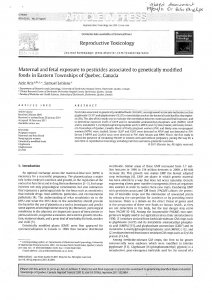
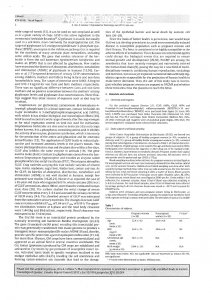
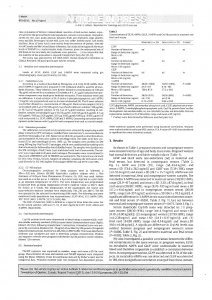
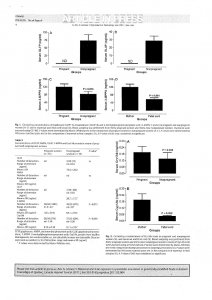
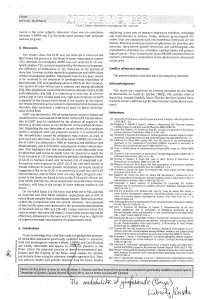
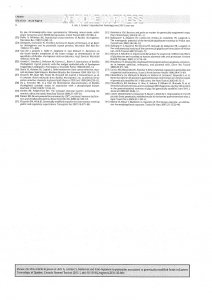



 学习了
学习了